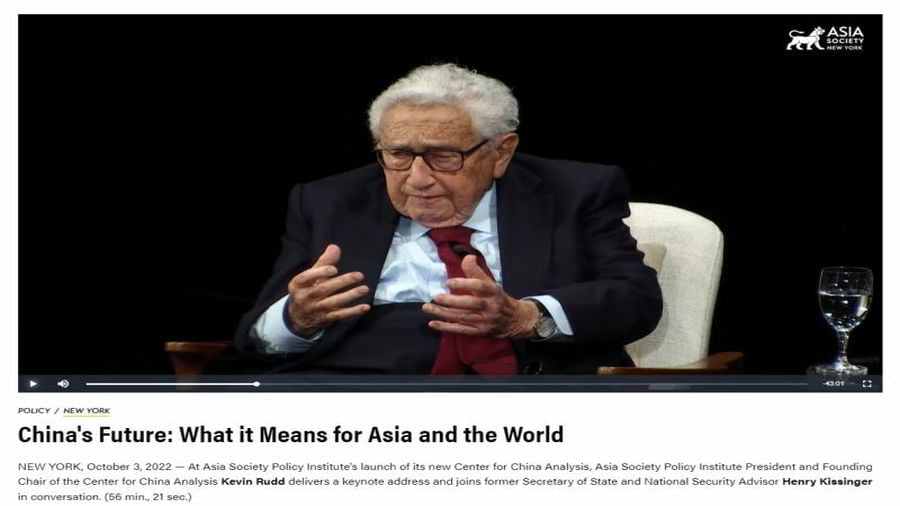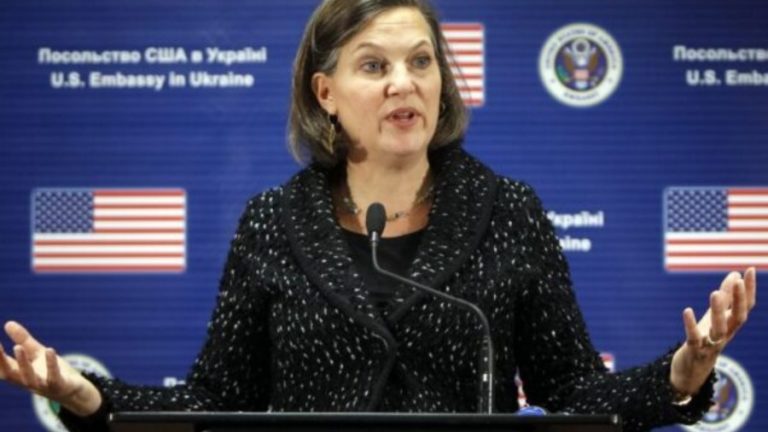Kissinger’s Prediction About a Forthcoming Policy Recalibration by China Is Probably Correct
Keeping in mind China’s grand strategic vulnerability at the moment, remembering the economic blackmail that the US is exerting to deter it from violating the anti-Russian sanctions, and considering their shared interests in reversing (or at least decelerating) those newly unleashed processes that are poised to bring an end to the bi-multipolar order from which they both benefit the most, a high degree of credence can thus be extended to Kissinger’s prediction of an improvement in Chinese-US ties.
Geostrategic mastermind Henry Kissinger predicted on Monday that Chinese President Xi Jinping will recalibrate his country’s policies after this month’s 20th National Congress due to the changing international situation caused by the Ukrainian Conflict. In his assessment, false expectations of a swift Russian victory are the primary driver, followed by the need to preemptively stop the US from rallying the West against China just like it’s already succeeded in doing against Russia.
This globally renowned expert on the People’s Republic believes that a slow easing of US-Chinese tensions could begin as early as November when their leaders meet at the G20 in Bali. Although it’s unclear what form this could take in practice, Kissinger doesn’t predict that it’ll result in China slowing down its rapid military buildup. Rather, he foresees President Xi postponing any serious confrontation with the US until sometime later in his administration.
There are several reasons why Kissinger’s scenario forecast is credible:
1. Despite fake news to the contrary, China was taken off guard by Russia’s special operation;
2. Even the US, which has every reason to smear China, acknowledged that it complies with sanctions;
3. And the systemic consequences of the Ukrainian Conflict derailed China’s superpower trajectory;
These reasons will now be briefly elaborated upon.
Regarding the first, President Putin hadn’t yet decided to authorize his country’s special operation by the time that he met with President Xi in early February because he was still (naively in hindsight) hoping for a peaceful diplomatic solution along the lines of Moscow’s security guarantee requests. The “no limits” aspect of their partnership contained in their joint statement wasn’t referring to promised economic and military support during that upcoming campaign, but was just a vague declaration.
This leads to the second reason related to China’s tacit compliance with the US’ anti-Russian sanctions. The objective reality is that the complex economic interdependence between it and the US-led West’s Golden Billion limits China’s strategic autonomy due to the Damocles’ sword of crippling Russian-like sanctions. The prior calculation that this relationship would preempt the EU from unilaterally making any mutually detrimental moves was discredited by it sanctioning Russia under US pressure.
And third, as explained at length here, China’s superpower trajectory was derailed due to: the conflict shattering any hope that the globalized economy upon which this grand strategy largely depends would recover to its pre-COVID state; Russia not rushing to accept lopsided deals with China out of desperation for a valve from Western pressure; India rising to play the role of an alternative such valve to prevent that from happening; and those two’s influence surging across the Global South to challenge China’s.
Building upon this last-mentioned reason about the unexpected derailment of China’s superpower trajectory, which was already in the process prior to the Ukrainian Conflict due to former US President Donald Trump’s trade war and the economic consequences of the pandemic but was arguably dealt a deathblow by everything that happened across the global system since the special operation began, it makes perfect sense for Beijing to at least mildly improve relations with Washington.
The logic is simple and it’s that China is extremely concerned that the US is plotting to manufacture the pretext for imposing crippling Russia-like sanctions against it via the latest provocations in Taiwan. That would risk threatening its status as a Great Power since it would coincide with the grand strategic crisis that it’s experiencing after the unexpected derailment of its superpower trajectory amidst the irreversible shattering of the globalized economy upon which all of its plans depended.
While its new development paradigm of dual circulation from late 2020 was meant to help it manage related challenges connected with Trump’s trade war and the economic consequences of the pandemic, it was promulgated with the expectation that no major conflict would break out in the interim. Dual circulation still requires time to enter into full effect and cushion the impact of systemic shocks on Chinese grand strategy, which thus makes it extremely vulnerable to economic warfare at the moment.
This explains why it bucked many experts’ expectations of extending “no-limits” support to Russia and instead tacitly complied with the US’ sanctions. For as regrettable as it is for China’s supporters to recognize, the fact of the matter is that Beijing cannot openly challenge Washington in any meaningful way right now because it’s essentially being held hostage by its rival’s economic blackmail. About that, the question thus arises of why the US hasn’t yet imposed Russia-like sanctions against it.
While this unprecedented move would advance America’s grand strategic goal of threatening China’s status as a Great Power, it also still carries with it plenty of potential for blowback that has thus far been assessed as unacceptable or at least premature to risk. First, the US hasn’t yet entrenched its successfully reasserted hegemony over the EU so it can’t take it for granted that its vassals will comply with anti-Chinese sanctions, let alone during the latest economic crisis caused by the anti-Russian ones.
Second, it would be mutually detrimental to have the West sanction China to such an extent because it would result in their abrupt “decoupling”, thus damaging both of their economies precisely at the time that the European part of the Golden Billion’s has just entered its worst crisis in decades. The US can’t confidently predict the strategic consequences that could arise as a result of the chain reactions set into motion by that development, some of which could be counterproductive by accelerating multipolarity.
Third, there’s always the chance that China could react militarily if it concludes that its window of opportunity for reunifying with Taiwan is about to close forever due to the complex sequence of events catalyzed by the West sanctioning it to the same extent as they just sanctioned Russia. The US might understandably want to keep tensions with China below the point of kinetic conflict, at least for now due to the preceding two reasons, hence why it’s holding off on this for the time being.
These calculations curiously create their own window of opportunity for the American and (aspiring) Chinese superpowers to jointly push back against the multipolarity processes that were accelerated by Russia’s special operation and India’s unexpected role in functioning as its alternative pressure valve. By repairing their relations, even if only mildly by more responsibly regulating their growing rivalry, the first-mentioned pair can attempt to breathe new life into bi-multipolarity.
This concept refers to the international status quo prior to Russia’s special operation whereby the American and (aspiring) Chinese superpowers exert the most influence over global affairs, below which are rising Great Powers like Russia and India, with comparatively medium- and smaller-sized countries representing the bottom rung of this de facto hierarchy. While bi-multipolarity still remains in effect, its end is drawing to a close as tripolarity and complex multipolarity (“multiplexity”) approach.
Those next two phases of the global systemic transition are made possible by the paradigm-changing consequences unleashed by the Ukrainian Conflict that were summarized here, without which International Relations would have remained bi-multipolar for the indefinite future. Its forthcoming evolution towards tripolarity driven by the emerging Russia-India (and Iran) axis prior to multiplexity adversely affects the American and (aspiring) Chinese superpowers’ grand strategic interests.
They both have natural interests connected to their role in global affairs, both existing and aspirational respectively, to push back against tripolarity-multiplexity in order to preserve bi-multipolarity for as long as possible. Taken to its extreme, which is unlikely but nevertheless can’t be ruled out, this is represented by the “Chimerica” scenario that was discussed over the past decade prior to Trump’s trade war whereby those two superpowers would agree to jointly rule the world.
Even in the miniscule chance that the American and (aspiring) Chinese superpowers somehow put aside their growing list of differences to advance their shared structural-systemic interests, neither would completely trust the other, which explains Kissinger’s prediction that President Xi won’t slow down his side’s rapid military buildup. China will continue its related efforts without interruption as part of its contingency planning in the event that this modern-day worldwide Molotov-Ribbentrop Pact collapses.
Keeping in mind China’s grand strategic vulnerability at the moment, remembering the economic blackmail that the US is exerting to deter it from violating the anti-Russian sanctions, and considering their shared interests in reversing (or at least decelerating) those newly unleashed processes that are poised to bring an end to the bi-multipolar order from which they both benefit the most, a high degree of credence can thus be extended to Kissinger’s prediction of an improvement in Chinese-US ties.







